Amidst the ongoing COVID-19 pandemic, the Green Growth Program Phase 3 (GGP3) that started in January this year has been progressing quite well. Now that we are fast approaching the end of 2021, we are delighted to report some of the highlights and achievements the GGP3 has managed to deliver, thanks to its highly committed counterparts, partners, donors and other supporters.
Sustainable Landscapes (SL) Project
Under the SL Project’s planning and policy outcome (Outcome 1) for the Forestry and Sustainable Landscapes sector, GGP3 has supported the national and subnational governments (Central Kalimantan, South Kalimantan, East Kalimantan, North Kalimantan, West Papua, Papua, and Jambi) in improving the quality of their plans, planning instruments, and policies through consultative approach and by synchronizing the results as far as possible as well as with GGGI technical advice given according to the needs of each government counterpart.
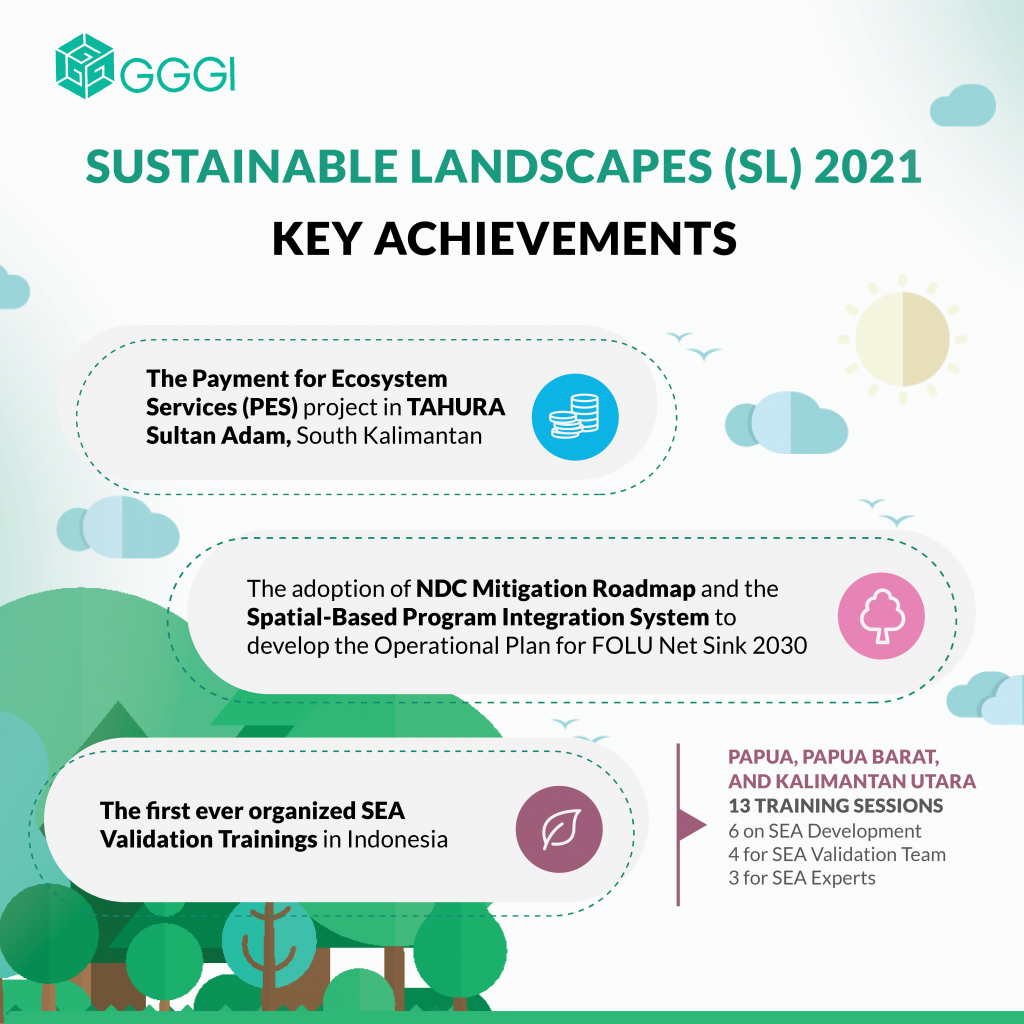 In total, GGGI supported 20 national and subnational plans and policies that adopted and mainstreamed the Indonesia GHG Emission Reductions agenda, including the subnational strategic environmental assessments, and the development and sectoral plans. An encouraging progress also came from Central Kalimantan, South Kalimantan, North Kalimantan and West Papua with expressed their commitment to replicate the East Kalimantan’s initiative on the provincial emission reduction program, which has secured investment commitment from the FCPF Carbon Fund.
In total, GGGI supported 20 national and subnational plans and policies that adopted and mainstreamed the Indonesia GHG Emission Reductions agenda, including the subnational strategic environmental assessments, and the development and sectoral plans. An encouraging progress also came from Central Kalimantan, South Kalimantan, North Kalimantan and West Papua with expressed their commitment to replicate the East Kalimantan’s initiative on the provincial emission reduction program, which has secured investment commitment from the FCPF Carbon Fund.
Under mobilizing investment outcome (Outcome 2), South Kalimantan with its Green Revolution Program has demonstrated notable progress. The Forestry Agency is spearheading the program, by initiating several projects, including a Payment for Ecosystem Services (PES) project—by working with GGGI, which gained majority support in October 2021.
Under the capacity development outcome (Outcome 3), 13 capacity activities have been organized for public officials. Through these activities, GGP3 has trained 545 civil servants and universities staff. Prioritization was given to Papua and West Papua Provinces who are developing their mandatory SEA documents after local elections. Notable value addition from GGGI’s interventions to the GGP3 is the direct coaching supplied to Papua and West Papua SEA writers and validator teams, working directly on their SEA documents, that increased not only the know-how but improved their SEA documents at the same time. GGGI also worked on building local SEA expertise by training local university staff with SEA know-how. The SEA validation trainings and mentoring organized in Papua, West Papua, and North Kalimantan are the first ever organized in Indonesia.
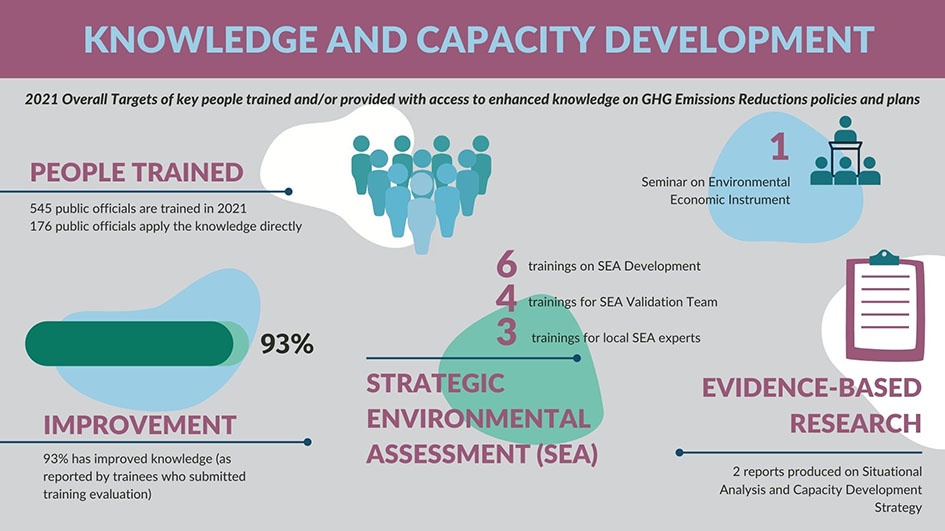
To support local Non-Timber Forest Product (NTFP) businesses, SL Project is also developing a comprehensive capacity program that introduces new skill-enhancement program through business incubation, market linkages, and assisting selected businesses to prepare and pitch to potential investors. These trainings are geared to upgrade local businesses to be greener and more bankable that in turn would support local livelihood opportunities. The first training is planned to be organized in North Kalimantan in January 2022.
Green-TAP Project
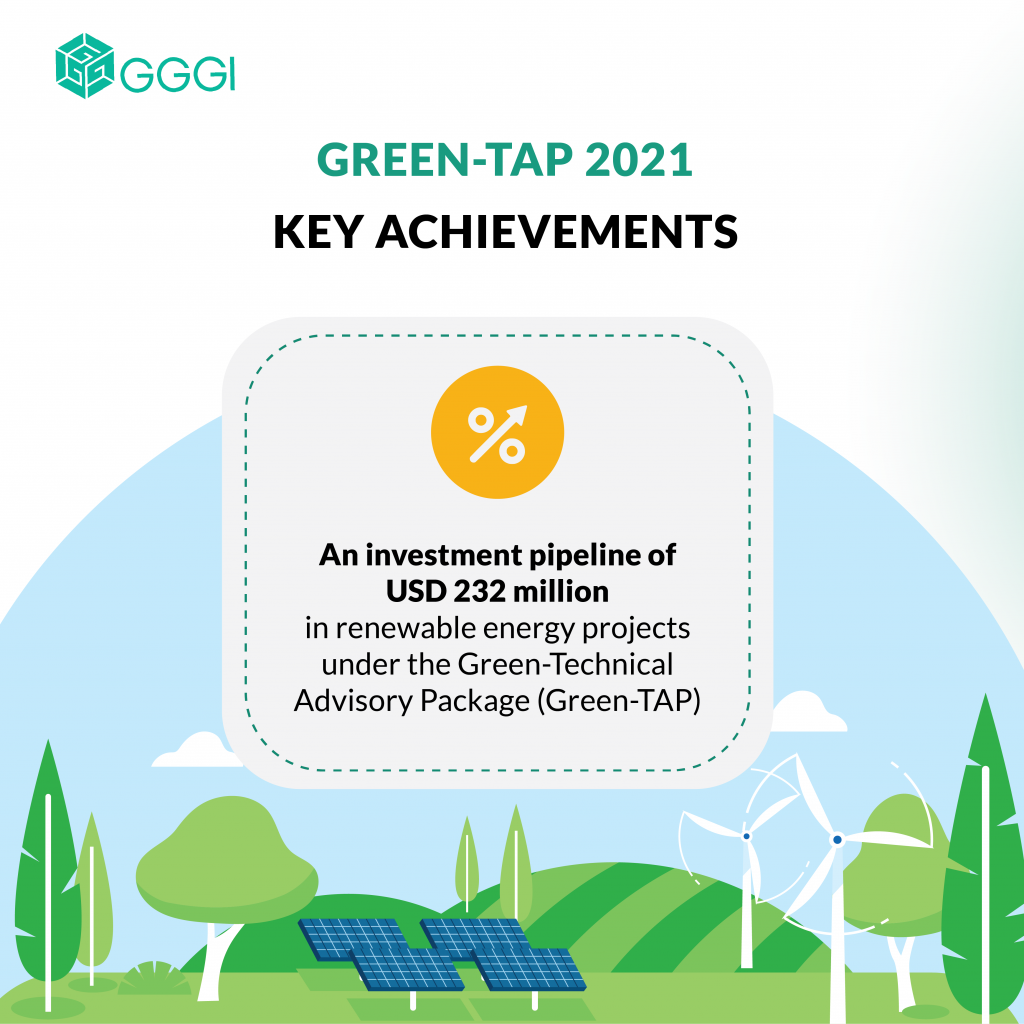 GGGI and PT SMI have also continued working in close collaboration since the signing of an MoU in 2016. Recently, the partnership took a step ahead to conceptualize and implement a renewable energy projects focused program. Since its commencement in July 2021, the Green-Technical Advisory Package (Green-TAP) project has been providing technical and financial due diligence support to PT SMI for five renewable projects (comprising of mini-hydro, biogas, and geothermal projects) that represent an investment pipeline of USD 232 million in Renewable Energy projects. The Green-TAP project is aligned with GGGI’s overall outcomes to mobilize investment in projects that contribute to Indonesia’s NDC and SDG target, in particular renewable energy projects.
GGGI and PT SMI have also continued working in close collaboration since the signing of an MoU in 2016. Recently, the partnership took a step ahead to conceptualize and implement a renewable energy projects focused program. Since its commencement in July 2021, the Green-Technical Advisory Package (Green-TAP) project has been providing technical and financial due diligence support to PT SMI for five renewable projects (comprising of mini-hydro, biogas, and geothermal projects) that represent an investment pipeline of USD 232 million in Renewable Energy projects. The Green-TAP project is aligned with GGGI’s overall outcomes to mobilize investment in projects that contribute to Indonesia’s NDC and SDG target, in particular renewable energy projects.
GCF Readiness Phase 2
GGGI, under the Green Growth Program Phase 3, has also been supporting the Fiscal Policy Agency, Ministry of Finance, as the National Designated Authority (NDA) GCF in Indonesia as the delivery partner for Green Climate Fund (GCF) Readiness program. Readiness program phase II, which started in 2020, has supported the development and strengthening of Indonesia’s GCF project pipeline, national climate finance strategy, direct access entities, and GCF country programming.
Through the 2nd Call for Project Concept Notes (PCNs), the Program has expanded the climate project pipeline in Indonesia and built the capacity of project proponents to develop robust climate projects. In the end, the Program brokered 11 concept notes matchmaking with eight national and international Accredited Entities (AEs). The total project value from these 11 concept notes (CNs) reaches USD 535 million, of which 60% will be co-finance from other resources alongside the GCF finance. It indicates a strong commitment from Indonesia’s project proponents towards climate projects. This demand-based approach strengthens the country ownership principle of projects that are financed by international climate funds. The program also strengthened the country ownership to further increase national entities’ (Direct Access Entities – DAE) capacity to enhance the access to the GCF. Among the 11 CNs, 4 CNs are being strengthened in collaboration with DAEs.
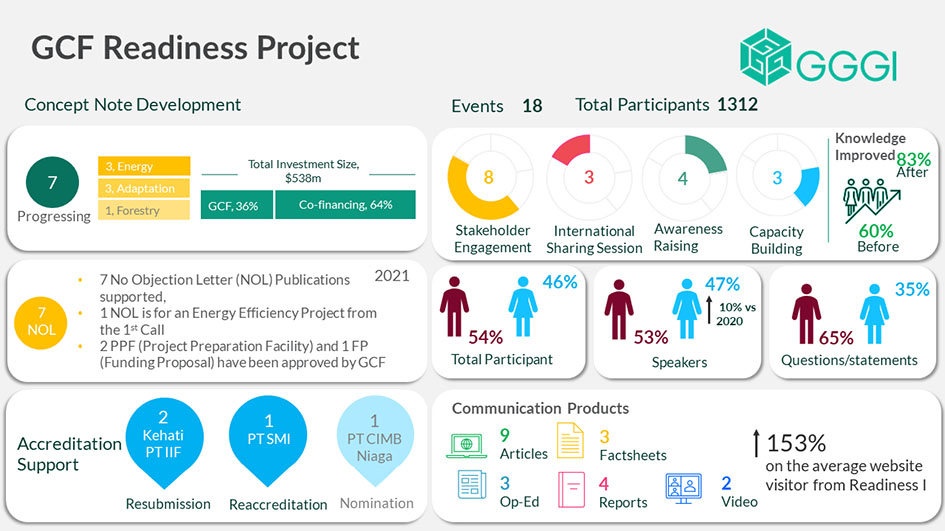
The GCF Readiness program phase II also has supported the Government of Indonesia in accelerating access to climate finance. Climate Finance Fiscal Framework (CCFF) is one of the policy studies to support the Government of Indonesia in formulating robust climate finance strategy from both domestic and international. The framework will be finalized in December 2021. International climate finance also highlights the importance of mainstreaming gender and social inclusion principles in its funded projects. Hence a guideline targeting Indonesia’s project proponents was developed for them.
Through the GCF Readiness program, the NDA has also conducted a knowledge exchange meeting with 3 other countries: Mongolia, Uganda, and Papua New Guinea. In the meeting, participants shared their experience and lessons learned in strengthening the country’s direct access to GCF, particularly on project pipeline development and DAE accreditation. Overall, throughout 2021, the NDA has held 8 awareness-raising sessions and 3 capacity-building activities. The event successfully engaged 1200 participants, with almost equal participation between men (54%) and women (46%).
DAPA Project
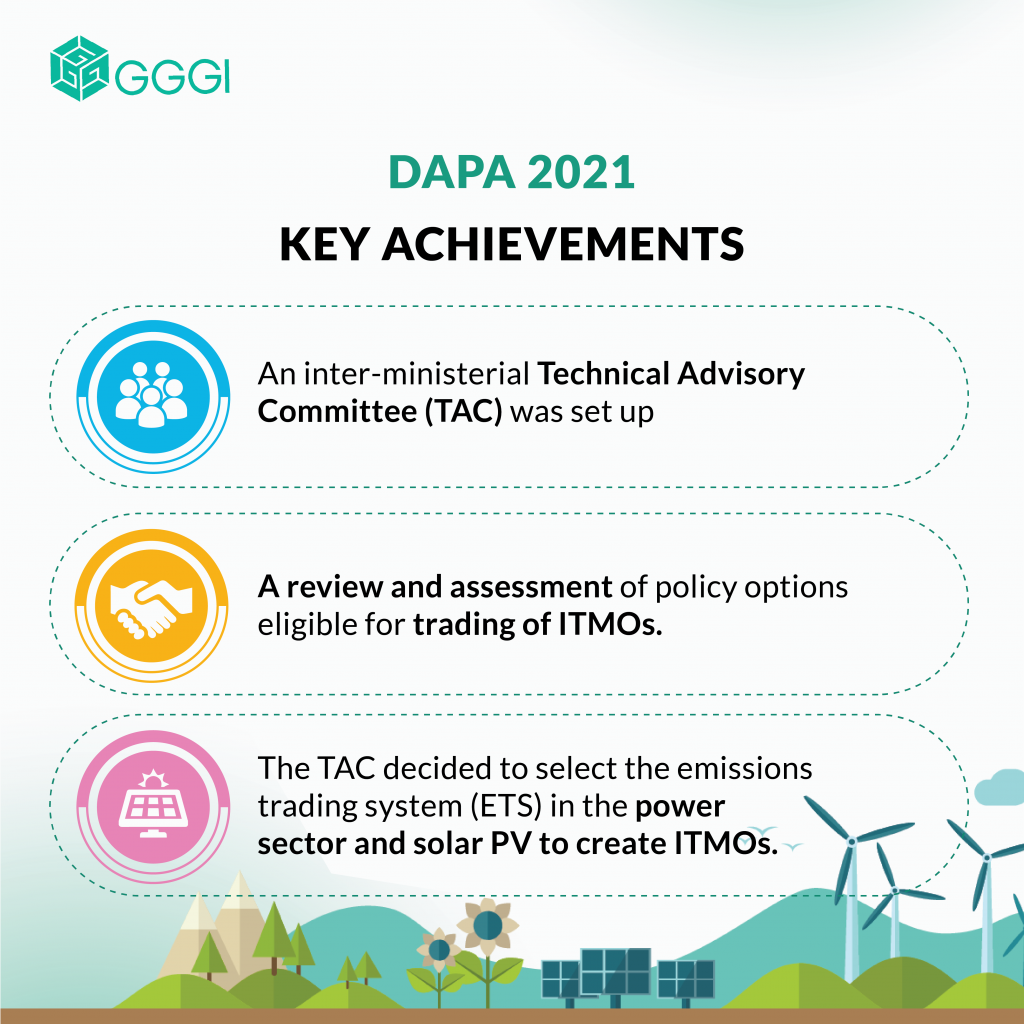 The objective of the Designing Article 6 Policy Approaches (DAPA) project is to support the Government of Indonesia in designing policy approaches to create Internationally Traded Mitigation Outcomes (ITMOs). These ITMOs can be traded as part of “additional” GHG emissions reductions that go beyond Indonesia’s NDC by using carbon trading rules under Article 6 of the Paris Agreement. Under the DAPA project, GGGI provides technical assistance to design a policy and governance framework in which ITMOs can be quantified, verified to avoid double-counting, and then transferred using bilateral agreements called Mitigation Outcomes Purchasing Agreements (MOPAs). The outcomes of the DAPA project will provide a good foundation for implementing carbon trading, an important economic instrument to achieve NDC and low carbon development goals, in lie with the recently issued Presidential Regulation 21/2021 on Carbon Pricing.
The objective of the Designing Article 6 Policy Approaches (DAPA) project is to support the Government of Indonesia in designing policy approaches to create Internationally Traded Mitigation Outcomes (ITMOs). These ITMOs can be traded as part of “additional” GHG emissions reductions that go beyond Indonesia’s NDC by using carbon trading rules under Article 6 of the Paris Agreement. Under the DAPA project, GGGI provides technical assistance to design a policy and governance framework in which ITMOs can be quantified, verified to avoid double-counting, and then transferred using bilateral agreements called Mitigation Outcomes Purchasing Agreements (MOPAs). The outcomes of the DAPA project will provide a good foundation for implementing carbon trading, an important economic instrument to achieve NDC and low carbon development goals, in lie with the recently issued Presidential Regulation 21/2021 on Carbon Pricing.
BioCNG
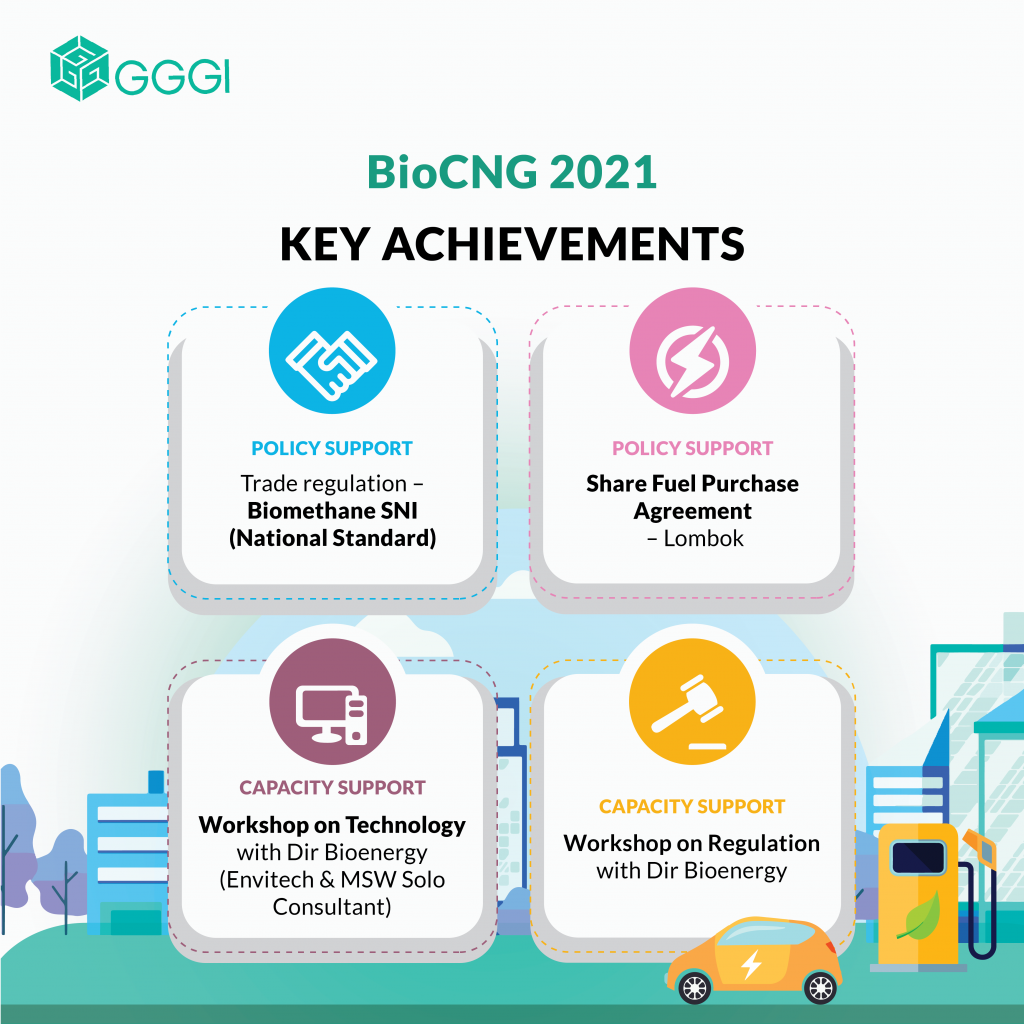 In Indonesia, the BioCNG project builds on GGGI’s work on renewable energy in Indonesia, and our close collaboration with the Ministry of National Development Planning (Bappenas) and the Ministry of Energy and Mineral Resources (MEMR) to date. The project focuses on developing waste from the palm oil sector, livestock manure and organic MSW as pipelines for BioCNG production. The vast potential of these types of waste for BioCNG generation can be realized by closing gaps in regulatory framework, by improving raw material quality and addressing perceived high risk in BioCNG ventures.
In Indonesia, the BioCNG project builds on GGGI’s work on renewable energy in Indonesia, and our close collaboration with the Ministry of National Development Planning (Bappenas) and the Ministry of Energy and Mineral Resources (MEMR) to date. The project focuses on developing waste from the palm oil sector, livestock manure and organic MSW as pipelines for BioCNG production. The vast potential of these types of waste for BioCNG generation can be realized by closing gaps in regulatory framework, by improving raw material quality and addressing perceived high risk in BioCNG ventures.
BioCNG adoption is expected to have several benefits in the country. It can boost sustainability profile of the agriculture industry, particularly the palm oil sector. It will reduce environmental pollution, landfill use and fuel import expenditure. A key benefit will be the necessary at-source segregation, which will help meet several nationally mandated targets for municipal waste management and the Bappenas/Ministry of National Development Planning’s strategy on Circular Economy.
Climate Action Enhancement Package (CAEP) Project
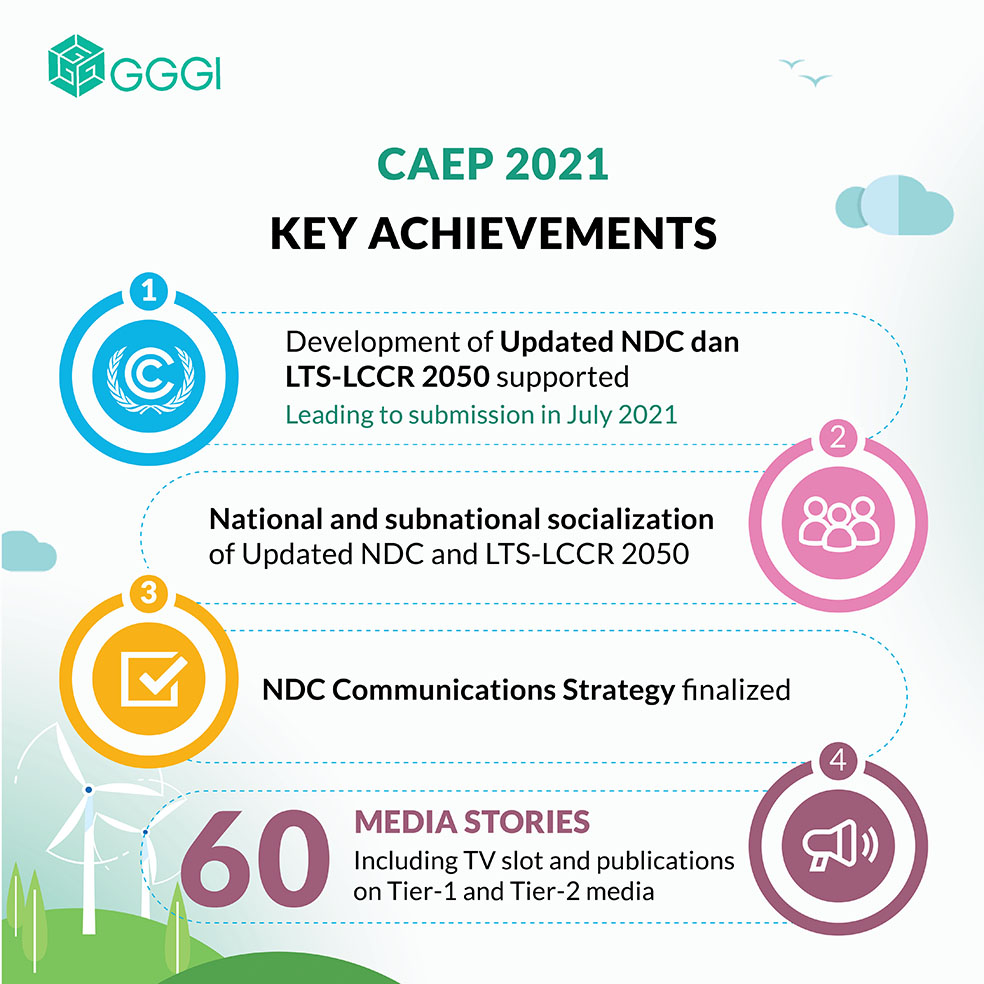 Under the Climate Action Enhancement Package (CAEP) Project, Indonesia has boldened its climate commitments through an Updated NDC—submitted to the UNFCCC on 22 July 2021—with fair emissions reduction targets and strengthened alignment between the country’s climate and development objectives. This comes after more than a year of extensive multi-stakeholder reviews and consultation processes under the helm of the Directorate General of Climate Change of the Ministry of Environment and Forestry (DGCC MoEF).
Under the Climate Action Enhancement Package (CAEP) Project, Indonesia has boldened its climate commitments through an Updated NDC—submitted to the UNFCCC on 22 July 2021—with fair emissions reduction targets and strengthened alignment between the country’s climate and development objectives. This comes after more than a year of extensive multi-stakeholder reviews and consultation processes under the helm of the Directorate General of Climate Change of the Ministry of Environment and Forestry (DGCC MoEF).
Indonesia is now committed to reduce its greenhouse (GHG) gas emissions target unconditionally to 29% and conditionally (with international support) to 41% compared to business-as-usual (BAU) scenarios of 834 Mt CO2e and 1,185 Mt CO2e, respectively, by 2030. The updated NDC reflects the progression beyond the existing NDC particularly in the enhanced ambition on adaptation, enhanced clarity on mitigation by adopting the Paris Agreement rule book (Katowice Package), aligning the national context that relates to the existing condition, milestones along with national development for the period of 2020-2024, and indicative pathways towards long-term vision (Vision Indonesia 2045 and the Long-Term Strategy on Low Carbon and Climate Resilient Development 2050/LTS-LCCR 2050), as well as Translating the Paris Agreement Rule Book (Katowice Package) into Indonesia’s context.
With strengthened mitigation and adaptation commitments, the Updated NDC reflects Indonesia’s adoption of the recently established Paris Agreement Rule Book (Katowice Package) into the national context to ensure effectiveness and efficiency in implementing the Agreement. This approach additionally communicates the progress and achievements in line with national development and long-term visions, which are reflected in the LTS-LCCR 2050.
RE-ACT
Indonesia has recently obtained support from the Government of New Zealand to accelerate the country’s transition from fossil based to renewable energy, through the Ministry of National Development Planning (Bappenas) and the Ministry of Energy and Mineral Resources (MEMR), enabling the achievement of Indonesia’s renewable energy targets and a more ambitious NDC. GGGI will assist Bappenas and MEMR in the implementation of a comprehensive programme of support as the delivery partner. As part of this partnership, New Zealand will provide USD 3.6 million, to support Indonesia’s transition to renewable energy.
The Grant Funding Agreement for the project, titled “Renewable Energy – Accelerated Transition in Indonesia” (RE-ACT), was signed on October 27, 2021, by the Ambassador of New Zealand to Indonesia, Mr. Kevin Burnett, and the Director General of GGGI, Dr. Frank Rijsberman. The five-year agreement officially appoints GGGI as the delivery partner of the Government of Indonesia, providing full support to Bappenas and MEMR through three workstreams: (1) policy framework and implementation support, (2) stakeholder engagement and capacity development, and (3) de-risking instruments and financing mechanisms designed through stakeholder engagement.
Monitoring, Evaluation, Reporting, and Improvement (MERI)
In 2021, GGGI Indonesia established a unit for monitoring, evaluation, reporting, and improvement (MERI). The unit has become a crucial hub for tracking and reporting program activities and results on a regular basis. It has improved reporting structures to make them more accurate, complete, and accountable.
MERI has developed monitoring plans for specific projects, and an overall program-level monitoring plan is being developed. These plans guide GGGI’s data collection, analysis, and reporting in line with the needs of Indonesian government partners, GGGI headquarters, and donors.
For new projects in development, MERI helps managers design results frameworks and choose indicators for outputs, outcomes, and impacts. Once project implementation is underway, these indicators are tracked to monitor progress and results on an ongoing basis.
A particular challenge in the coming year will be to better evaluate the impacts of GGGI’s projects and program towards the achievement of Indonesia’s goals for climate change mitigation and sustainable development.
Communications
The communications work, which supports all projects under GGP3, aims primarily at increasing awareness on and enhancing access to various knowledge and information to the Government of Indonesia’s NDC and LCDI ambitions. The work for Phase 3 began with a comprehensive Situational Analysis with specific focus on communications to better support the government’s communication. Through in-depth interviews and Focus Group Discussion, findings conclude that communications on these topics are currently ineffective in raising the audience’s awareness and appetite. The audience’s low awareness and appetite are mainly caused by three factors: (1) utilization of difficult technical terms, (2) one-way communications style, and (3) difficulties in obtaining information.
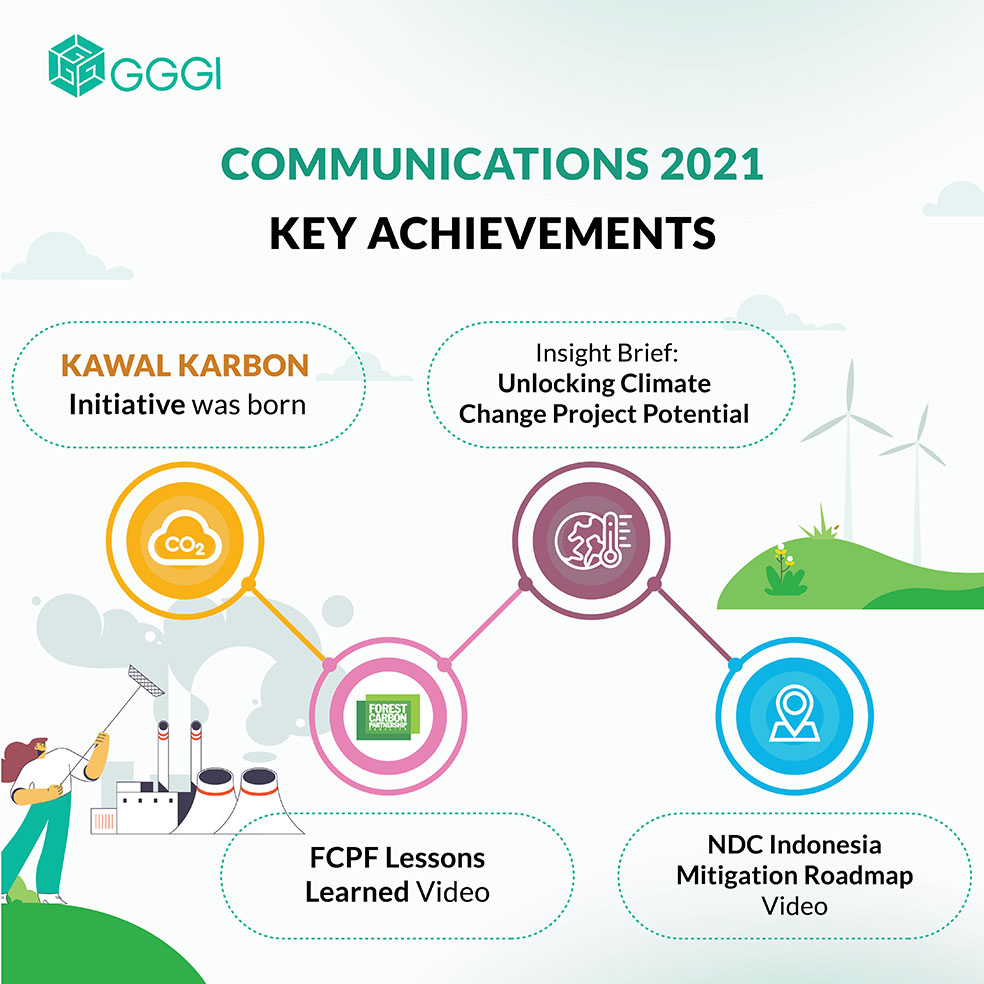 Results of the analysis have been translated into Communications Strategies for NDC and LCDI, which call for the “democratization” of NDC and LCDI, interpreting inclusivity as “I know and you know what we are talking about” and, in communications, it means opting to use the simplest, plainest language as possible, taking discussions down to street levels and to casual hangouts among best friends.
Results of the analysis have been translated into Communications Strategies for NDC and LCDI, which call for the “democratization” of NDC and LCDI, interpreting inclusivity as “I know and you know what we are talking about” and, in communications, it means opting to use the simplest, plainest language as possible, taking discussions down to street levels and to casual hangouts among best friends.
The results, particularly on NDC, have given birth to an initiative called “Kawal Karbon” (safeguarding carbon) launched by MoEF’s Secretary of the Directorate General of Climate Change (DGCC). The initiative will be the main platform for democratization efforts of NDC and for the governance of MoEF’s key stakeholders’ participation in the implementation of the Updated NDC and LTS-LCCR 2050 documents recently submitted to UNFCCC in July 2021, as well as the preparation of carbon pricing regulation. The initiative is complemented with a variety of outreach products including the Kawal Karbon Policy Brief, the Kawal Karbon Video, and the Kawal Karbon Dictionary, which will explain many technical terms and concepts described in the Updated NDC and LTS-LCCR 2050 in simple everyday language.
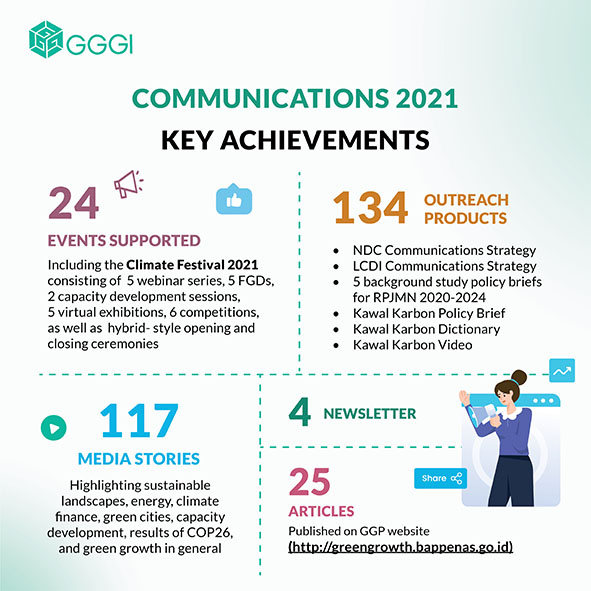 For LCDI, a communications planning workshop was conducted as a follow-up to the analysis results and communications strategy. Participated by 20 people consisting of key staff of the LCDI Secretariat, including the secretariat’s communications team and staff of Bappenas’ Directorate of Environment, results of the workshop consisted of key messages, target audience, and communications channels currently available at LCDI Secretariat, based on inputs collected from the participants. The final result was a skeleton or a draft framework of LCDI Communications Plan, which is expected to be finalized by the end of this year and will then continue to serve as a blueprint for all communications activities of the LCDI Secretariat, beyond the life of this project.
For LCDI, a communications planning workshop was conducted as a follow-up to the analysis results and communications strategy. Participated by 20 people consisting of key staff of the LCDI Secretariat, including the secretariat’s communications team and staff of Bappenas’ Directorate of Environment, results of the workshop consisted of key messages, target audience, and communications channels currently available at LCDI Secretariat, based on inputs collected from the participants. The final result was a skeleton or a draft framework of LCDI Communications Plan, which is expected to be finalized by the end of this year and will then continue to serve as a blueprint for all communications activities of the LCDI Secretariat, beyond the life of this project.